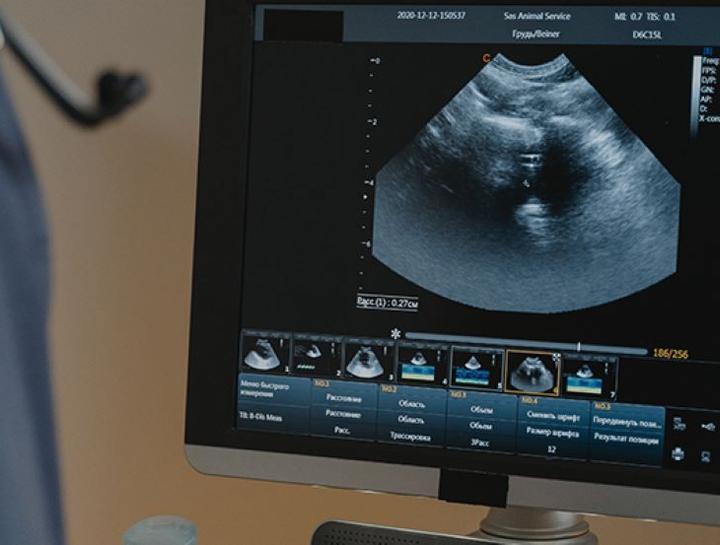Pet Ultrasound
A non-invasive way to diagnose sick & injured pets.
We offer veterinary ultrasounds for pets. Much like ultrasound for people, pet ultrasound is a safe, non-invasive imaging technique used to diagnose sick and injured animals.
Our pets can develop all sorts of illnesses and conditions like tumors or cysts, or even eat things they shouldn't that can get lodged inside them. Ultrasounds are a kind of diagnostic imaging technology that transmits sound waves into your dog or cat's body in order to produce a picture in real-time of an area of their body.
Veterinary ultrasounds are fast, non-invasive and can be used to diagnose or evaluate a number of issues problems with your pet's internal organs or to check on your pet's pregnancy.
At Ramsey Veterinary Hospital, ultrasounds are done here in hospital. Our team of veterinarians use ultrasound and other diagnostic tools to provide an accurate diagnosis of your pet’s medical issues, so we can provide your pet with the most effective treatment possible.
Types of Ultrasounds
Emergency Ultrasound
If your pet is experiencing an emergency, the ultrasound will usually focus on the abdomen and chest to quickly learn whether your dog or cat has a serious internal hemorrhage (bleeding) or pneumothorax (a condition in which gas or air collects in the space surrounding the lungs). This can assist us in diagnosing the issue quickly. We can then plan effective treatment.
Echocardiogram
Also referred to as cardiac ultrasounds, with these detailed ultrasounds we can closely assess the heart and its surrounding structures, including the pericardial sac. This will tell us whether the heart is functioning properly and whether there is a malfunction in the heart.
Abdominal Ultrasound
Used to look further at the internal structures and organs within your pets abdomen.
Conditions Which May Mean Your Pet Could Benefit From an Ultrasound
Abnormal Blood or Urine Test Results
If your veterinarian discovers any abnormalities on physical exam, anomalies or abnormalities in your pet's urine tests or blood samples, they may recommend that your pet have an ultrasound in order to gain a better picture of their internal organs to identify what is causing the issue.
Diagnostic Imaging of Soft Tissue Injuries & Illness
Almost all kinds of soft tissue can be examined in detail thanks to ultrasound imaging technology.
If abnormal tissue is spotted during an ultrasound, the vet may also use the ultrasound to help collect tissue samples from the affected area.
Ultrasound-Assisted Tissue Collection & Biopsies
Samples are typically collected using ultrasound-guided fine-needle aspiration.
If your vet will be performing an ultrasound-assisted tissue collection, your pet will likely be sedated. We can perform biopsies in a less invasive manner with ultrasound.
How To Prepare Your Dog or Cat for Their Ultrasound
Ultrasounds performed on different areas of your pet's body require different kinds of preparation. Ask your vets for the specific things you need to do to help prepare your pet for their ultrasound.
Ultrasound Results For a Fast Diagnosis
Since your vets can perform an ultrasound in real-time, they will get the results immediately, however all of our diagnostic ultrasounds are sent out for a specialty interpretation and report providing further recommendations based on the findings.

